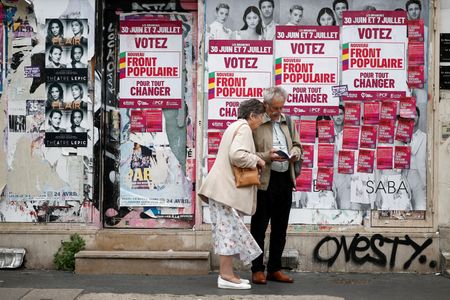By Ingrid Melander
PARIS (Reuters) -Exit polls after Sunday’s first round of the snap parliamentary election in France showed the far-right National Rally winning Sunday’s first round, but the final result will depend on days of horsetrading before the July 7 run-off. The RN might win in the end, but may end up without an absolute majority.
What happens then, and can political paralysis be avoided after the election.
SHORT ANSWER: NO ONE KNOWS FOR SURE
Article 8 of the constitution says the president appoints the prime minister, but does not say which criteria he should use.
In practice, President Emmanuel Macron would be expected to offer the job to the leading parliamentary group – which opinion polls and the first round of voting suggest will be the eurosceptic, anti-immigration RN.
RN CHIEF BARDELLA TO BE PRIME MINISTER?
The RN has said party leader Jordan Bardella is its candidate for prime minister but has also said it will turn down the job if it and its allies together do not win an absolute majority of at least 289 seats.
Since the constitution does not say how he should choose his prime minister, Macron could, in theory, try to pull together an anti-RN alliance and offer the job to another party, or someone who is not politically affiliated.
IF NOT BARDELLA, WHO?
The constitution does not provide any specific answer.
Options would include:
– trying to strike an alliance of mainstream parties. No such alliance exists now but Macron has urged parties to unite to keep out the far-right.
– offering the job to the left, if an alliance including the far-left, Socialist Party and Greens emerges as the second-biggest group, as opinion polls suggest. The left could then try to form a minority government.
WOULD ANY OF THOSE OPTIONS WORK?
If the RN wins the highest share of the vote and accepts the prime minister post, a period of “cohabitation” with Macron would begin. That has happened three times in France’s modern political history, but with mainstream parties. The RN could struggle to get ideas for change adopted.
If the RN is the largest party in parliament, but is not in power, it could block or modify government proposals. The constitution gives the government some tools to circumvent that, but with limits.
If the RN secures a majority, it would be largely guaranteed to get the prime minister job as it could force any government it disagrees with to resign.
WHAT HAPPENS IF THERE IS NO DEAL?
It’s possible that none of the three groups – the far-right, centrists and left – will be big enough to govern alone, reach a coalition deal or get assurances it can run a viable minority government.
In such a case, France would risk political paralysis, with little or no legislation being adopted and a caretaker government running basic daily affairs.
COULD MACRON RESIGN?
Macron has ruled this out, but it could become an option if everything is blocked. Neither parliament nor the government could force him to do that.
WHAT WON’T HAPPEN UNDER ANY SCENARIO
The constitution says there can be no new parliamentary election for another year, so an immediate repeat vote is not an option.
(Additional reporting by Johnny CottonWriting by Ingrid MelanderEditing by Timothy Heritage and Frances Kerry)











